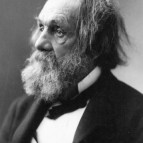
It is probably no accident that Edward Everett Hale (1822–1909) was a life-long American patriot. He was the nephew of Edward Everett, renowned orator and statesman. And his father, Nathan Hale, was the namesake and nephew of Nathan Hale, executed by the British for espionage during the Revolutionary War and famous for his last words: “I only regret that I have but one life to lose for my country.” As a Unitarian minister in Boston, as Chaplain in the United States Senate, and as a prolific writer of essays and short fiction, Hale was a devoted activist, championing especially the causes of the abolition of slavery and the advancement of public education.
Edward Everett Hale
Edward Everett Hale (1822–1909), Unitarian minister and antislavery activist, was a prolific author of stories, essays, and poems, many on patriotic themes. In 1882, Hale visited Spain to conduct research on Columbus and his travels, writing his biography on the explorer—The Life of Christopher Columbus: From His Own Letters and Journals—in time to be released for the 400th anniversary of Columbus’ discovery. The following selection, a poem in which he presents a novel view of the reason for, and the meaning of, Columbus’ voyages, comes from his 1903 collection of songs and poetry, New England History in Ballads.
Edward Everett Hale
In this story from 1899, Edward Everett Hale explores the relation between the holiday of Thanksgiving and the practice of generosity. But by building the story around immigrants and polling-booths, Hale also invites us to think about citizenship and the meaning of America, as well as our principles of freedom and equal opportunity.
Edward Everett Hale
Edward Everett Hale (1822–1909), Unitarian minister, antislavery activist, and for a time chaplain in the United States Senate, was also a prolific author of essays and stories, of which this one—written in 1863, the year of the Emancipation Proclamation—is the best known.
Edward Everett Hale
The inauguration of George Washington—and those of other presidents since—is accompanied by ceremonies that might strike a democratic temperament as resembling kingly coronations. This account, written by clergyman, prolific essayist, and story-writer Edward Everett Hale (1822–1909), best known for his story “The Man without a Country,” describes Washington’s first inauguration, with special attention to some of its ceremonial features.
Edward Everett Hale

